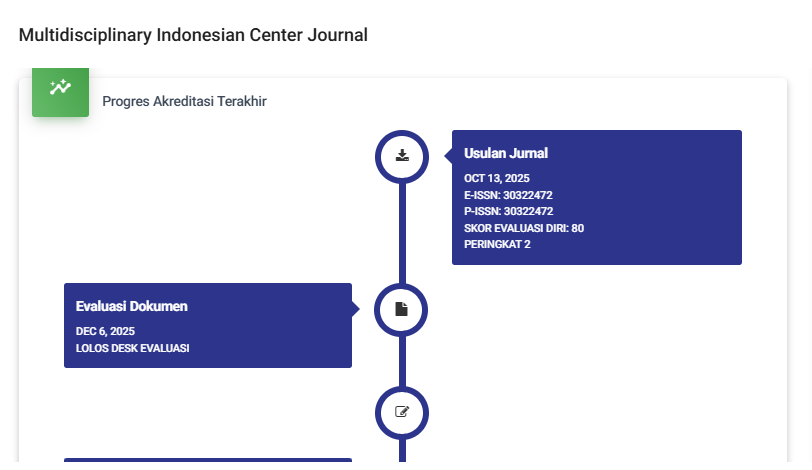THE INFLUENCE OF ARTIFICIAL INTELLIGENCE LITERACY ON LEADERSHIP EFFECTIVENESS IN FINANCE INDUSTRY
DOI:
https://doi.org/10.62567/micjo.v2i3.959Keywords:
AI Literacy, Leadership Effectiveness, Finance Industry, Digital Transformation, Organizational PerformanceAbstract
This research investigates the impact of AI literacy on leadership effectiveness within the finance industry, a sector experiencing rapid digital transformation. As artificial intelligence becomes increasingly integrated into financial operations, leaders are required to possess not only traditional managerial skills but also a strong understanding of AI concepts, applications, and ethical considerations. Using a quantitative approach, data were collected from 55 finance professionals occupying leadership roles across various organizations. The study assessed their levels of AI literacy and examined its relationship with their perceived leadership effectiveness. The results reveal a significant positive correlation between AI literacy and leadership effectiveness, indicating that leaders with higher AI literacy are better equipped to drive innovation, make strategic decisions, and successfully adapt to technological change. These findings highlight the importance of integrating AI literacy into leadership development programs and fostering a culture of continuous learning to ensure sustained organizational agility and competitiveness in the finance sector.
Downloads
References
Al-Ababneh, H. A., Borisova, V., Zakharzhevska, A., Tkachenko, P., & Andrusiak, N. (2023). Performance of Artificial Intelligence Technologies in Banking Institutions. WSEAS Transactions on Business and Economics, 20, 307–317. https://doi.org/10.37394/23207.2023.20.29.
Avolio, B. J., & Bass, B. M. (2004). Multifactor Leadership Questionnaire. Manual and Sampler Set (3rd ed.). Redwood City, CA: Mindgarden.
http://dx.doi.org/10.1207/s1532754xjprr1602_2.
Celik, I. (2023). Exploring the Determinants of Artificial Intelligence (AI) Literacy: Digital Divide, Computational Thinking, Cognitive Absorption. Telematics and Informatics, 83, p. 102026. https://doi.org/10.1016/j.tele.2023.102026.
Chaffey, D., & Ellis-Chadwick, F. (2019). Digital Marketing: Strategy and Implementation. Pearson Education.
Davenport, T. H., & Ronanki, R. (2018). Artificial Intelligence for the Real World. Harvard Business Review (HBR).
Deshmukh, P. B., Nikam, P., & Moholkar, N. (2024). Role of Artificial Intelligence in Financial Management. ShodhKosh: Journal of Visual and Performing Arts, 5(6), 541–557. https://doi.org/10.29121/shodhkosh.v5.i6.2024.1765.
Fares, O. H., Butt, I., & Lee, S. H. M. (2023). Utilization of Artificial Intelligence in the Banking Sector: A Systematic Literature Review. Journal of Financial Services Marketing, 28(4), 835–852. https://doi.org/10.1057/s41264-022-00176-7.
Kotler, P., & Armstrong, G. (2008). Principles of Marketing (12th ed.). Pearson Education.
Kotler, P., & Keller, K. L. (2016). Marketing Management (15th ed.). Pearson Education.
Levine, Ross; Beck, Thorsten; Demirgüç-Kunt, Asli. (2009). Financial Institutions and Markets Across Countries and Over Time : Data and Analysis. Policy Research Working Paper, No. 4943. http://hdl.handle.net/10986/4154.
Loudon, D. L., & Della Bitta, A. J. (1993). Consumer Behaviour: Concepts and Applications (4th ed.). New York: McGraw-Hill.
Rahman, A. (2024). Artificial Intelligence (AI) Role in Financial Literacy in the Banking Channels: Mobile Apps and Physical Branches. Journal of Economics and Management, 4(1), 150–155. https://doi.org/10.3126/jem.v4i1.72995.
Russell, S. J., & Norvig, P. (2021). Artificial Intelligence: A Modern Approach (4th ed.). Pearson. https://doi.org/10.1109/MSP.2017.2765202.
Rustandi Rustandi, & Andi Harmoko Arifin. (2024). AI in Finance: A Systematic Literature Review. Proceeding of the International Conference on Economics, Accounting, and Taxation, 1(2), 55–71. Retrieved from https://prosiding.areai.or.id/index.php/ICEAT/article/view/36.
Siregar, F. A. (2024). The Role of Artifical Intelligence in The Performance of Indonesian Sharia Bank: A Systematic Literature Review. Proceeding International Conference on Islamic Economics and Business (ICIEB), 3(1), 128-142. https://conference.uin-suka.ac.id/index.php/ICIEB/article/view/1483.
Downloads
Published
How to Cite
Issue
Section
License
Copyright (c) 2025 Yonghwa Han, Andini Nurwulandari, Hasanudin

This work is licensed under a Creative Commons Attribution-ShareAlike 4.0 International License.



























